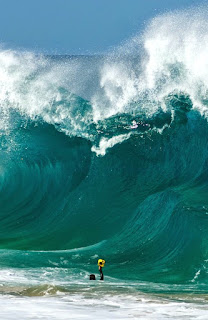With Jesus in your boat ..
Matthew 8.23-27 (an all age talk)
The sea can be terrifying
Some of you will have heard me tell of the time when we
went on a day trip to the isle of Aran, off the coast of Ireland, in the
Atlantic Ocean. It was terrifying. I clung on to the post and Alison clung on
to me.
It wasn’t quite as bad as this (Clark Little)
but it was almost as bad as this!
We thought we were going to die.
And for the disciples in the boat, the waves were very
scary.
Jesus had said, ‘Let’s go to the other side of the lake’.
He got into the boat and they followed him. The passage is very clear about
that. Just a few verses earlier Jesus has told them that following him is not
going to be easy, but these men had decided to follow Jesus. So they are doing
what is right. And they think that they are going to die.
Maybe you were on a plane and it hit an air pocket and simply
drops out of the air. Someone defined air travel as ‘hours of boredom
punctuated by seconds of stark terror’.
Or maybe it is sickness or a conflict or a situation that
you were or are facing. It is overwhelming and you are very frightened.
This story is very relevant to us. We’re feeling
particularly overwhelmed …
Image of wave and pencil and invite people to write/draw/talk about a time when they were seriously scared.
The followers of Jesus are terrified. Some of them are
fishermen. They know the sea. But they are in a little boat, and there are big
waves. And they are in danger of sinking, and they are terrified.
So it is not surprising that they wake Jesus up and say
to him, ‘Lord, save us. We are perishing’.
Who else do you go to, when you are completely out of
your depth?
Dallas Willard was asked by someone who knew he was a
Christian, ‘Why do you follow Jesus?’ To which he is said to have replied, ‘But
who else is there to follow?’
But having turned to Jesus, it does not seem very fair of
Jesus to tell them off for being scared. He says, ‘Why are you afraid, you of
little faith?’
But they have already seen Jesus do remarkable things.
·
Healed someone with a dreaded skin disease with
a touch
·
Healed someone who was paralyzed and in great
distress from a distance with a word
·
Healed Peter’s mother in law, and cured many
people who had been brought to him.
They may not yet realize that Jesus is God’s ruler; they
may not yet realize that he is the Son of God, but they did know that he was
quite remarkable.
And they did not need to worry because Jesus, although he
was asleep, was with them.
When we arrived at the isle of Aran we realised that if
we didn’t wish to spend the rest of our lives on Aran (although I have to admit
at the time it was one the options I seriously considered) we had to take the journey
back. The wind was just as strong. But this time I decided not to look at the
waves. I looked instead at the crew of the boat. They were completely
unconcerned. And because they weren’t worried, I began to relax. I thought, ‘They’re
OK, so the boats OK, so I’m OK. I’m not going to drown’. And I even began to
sort of slightly enjoy the journey.
The hope for me as I face what seems a huge wave, an overwhelming
task, is that I do not need to worry, because Jesus is with us.
The hope for the person who believes in Jesus, who has decided
to follow him and to do what he says, is that it will be hard. We will face huge
waves, very frightening waves; we will even face the wave of death. But we do
not need to worry. Jesus is with us.
And although there are times when life is very scary, the
secret is this. Do not look at the wave – even if it is very big and scary.
Look instead at Jesus. It may seem that he is asleep. But he is with us. He is
beside us. He is even within us. And we can trust him because he is the one who
brings God’s healing with a touch or a word. He is the one who can stand up in
front of a boat and rebuke wind and the waves, and there is complete calm. And
he is the one who rose from the dead.




Comments
Post a Comment